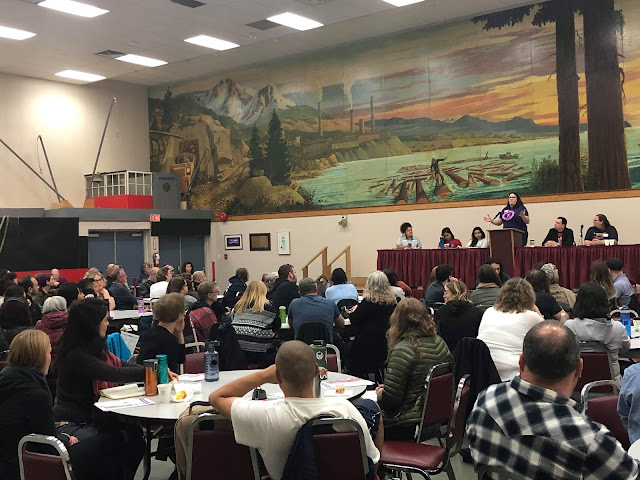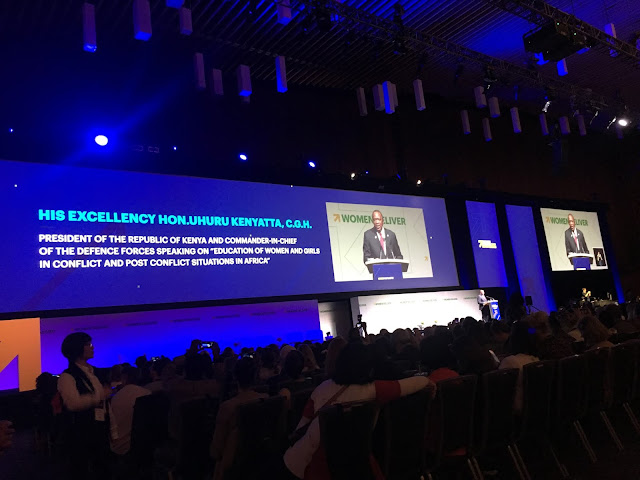Anita Hill: Gender, Race and Power in the Academy
An interesting partnership between the Faculty of Law, Urban Studies Program, Social Justice Institute, Institute for Critical Indigenous Studies, and the Sauder School of Business brought Professor Anita Hill to UBC for an evening to discuss Gender, Race, and Power in the Academy.
Cecilia Point and a group of women from the Indigenous Law Students group gave the territorial acknowledgment for tonight. Cecilia Point is so moving to listen to - I always feel fortunate to share space with her and take her words to heart. Tonight she connected the dots between the Angela Davis talk last fall and tonight's event. We were then treated to Women's Warrior Song. What a great way to start the event!
Next up was Elvin Wyly, chair of the Urban Studies Program in the department of Geography and I have to say I was really impressed. He packed a lot into his remarks which I felt were really earnest in delivery - it's not everyday a white man can speak truth to power about equity, diversity, patriarchy, education and class. In the context of today's world where there still is aggressive male entitlement over women's bodies. He cited feminist economic geographers J.K. Gibson-Graham by recognizing the connection between capitalism and sexual violence. He talked about the evolution and revolution of intergenerational intersectionality and it's weaponization by the right. At the end he challenged us to look at universities as having to rewire the power and dominations of toxic masculinities and to rise to the challenge for real equality.
He then introduced one of his PhD students - Rachel Bydolf-Horwitz, as one of his mentors, which was really cool. She was great - she introduced Anita Hill, not by her credentials but by "What Anita Hill Means to Us" - sharing stories from various students. There was one word that was repeated over and over again - COURAGE.
I was sitting with my pal Erin, who I've known since grade 8 and we said the same thing. We were 10 when Anita Hill testified in front of Congress in 1991. I remember her name because it was all over the news and in the headlines but I never really knew why her case and testimony was so significant. After seeing a number of TV shows, movies and documentaries about Anita Hill, it was almost like she was some mythological character, part of sexual harassment lore. She's got a great energy about her. Her academic credentials are impressive and she's a great public speaker (not unusual since she's a lawyer and a professor) who grabs your attention right away.
Professor Hill's talk this evening was taking the topic of gender, race and power and situating it in the academy and having a frank talk about the tension that it can influence equality at the same time increasing inequality. Sexual harassment and assault is rampant on university/college campuses. The context for this discussion centred around the demand for physical safety as well as intellectual honesty of the diversity and richness of ideas. It's not lost on anyone that a more educated society tends to vote more progressively. If politicians can suppress access to education (by holding back money from our academic institutions) it solidifies their bases (the votes they need) to keep their jobs and the current power structures stay in place to ensure their re-elections.
Our universities and colleges are places where gender, race, class and other identities clash with power. You have a group of people who attend to be educated, to achieve the universal dream but at the institutions, the power is held by a privileged few. And what are sexual harassment and sexual assault really about? POWER. It's never about sex or romance. The focus needs to be on a larger goal to fix the imbalance of power rooted in identity differences that leads to marginalization and the disempowerment of society. She was very adamant that higher education needs to spend some time studying and intervening in the roots of sexual violence on campus.
She talked about Judith Lictman's story from when she was a law student in 1961 where she was one of 2 women in a class of 150. One of her (dirtbag - my word not hers) professors was notorious for calling on the women in class once per term - and that was to comment on the "rape" case and if they didn't use the word "penetration" they would be ignored or worse. This was "part of what they signed up for" and they didn't dare report it to the Dean.
There was significant discussion on gendered racism in the academy. Where competencies, credentials and expertise is challenged and questioned when the faculty aren't white men. I've experienced this in the labour movement, where my work and credentials are constantly questioned and I have to keep proving myself, whereas my male counterparts don't. They are often seen as the knowledge holders automatically, even if I have more experience and education. It's my lived experience and that's as a privileged white woman. It's a million times worse for so many others...I digress, back to the topic at hand. Mentorship, research funding, publishing are all affected and can affect one's career. That means men are often more tenured and rise to the top of their disciplines faster.
Sexual harassment doesn't exist as an isolated behaviour; it's at the core of a culture that dismisses and devalues women. She told us the story that there wasn't any federal action on the creating of guidelines, policies and investigation processes to protect students against sexual assault until 2011! 2011!!!! HOLY. That meant that the power dynamic that exists between professors and students would be exploited and the perpetrators of abuse got away with it, still taught with little or no consequences. People who are seen as credible in their disciplines often come to each other's defence, trying to discredit the person who comes forward to report their assault. We've seen this at UBC a number of times, and just look at the dumpster fire that is CanLit these days...ugh. Students have been hiding successful protests regarding safe spaces on campus to hold their universities accountable to Title IX.
Racialized stereotypes are dangerous. Not just because of the visible violence they can incite but also the insidious way they can influence believability and credibility. How many people does it take for it to be believable that someone can be an abuser? It wasn't until A-List white actresses came forward about Harvey Weinstein. People weren't so sure when it was an unknown woman who can forward with her story. #metoo didn't gain credibility until white women entered the narrative. We have so much further to go.
Anita Hill is hopeful though. Students become alums and alums become citizens. She cited 2 cases where alums took their alma maters to court for inaction on sexual assault while they were students. One at Princeton and one at Christendom College.
As she moved on to her conclusion the room was silent - everyone totally enraptured by her words. She really summed it up with these concluding thoughts:
- Our academic institutions need to invest in studying sexual harassment and assault and their root problem in relation to gender, race, sexual orientation, class, etc...
- dismantle the structures that institutionalize power abuse in our schools
- change how and who gets to define equality
- equality isn't just about opportunity but the outcomes of our lived experiences
- shift the onus/burden of ending oppression from the marginalized
- institutions should not be given a "pass" just because they are known as liberal or progressive -bad behaviour still happens and we must hold everyone accountable especially when it involves anything in the continuum of sexual misconduct
After she was done we went right into a panel discussion where she was joined by 3 UBC professors - Jennifer Behrdahl (Sauder), Sunera Thobani (Social Justice Institute) and Sarah Hunt (Institute for Critical Indigenous Studies). They talked about sexism that exists on campus, masking of deep inequality with the rhetoric for change, settler-colonialism underpinning everything, how intersectionality has homogenized women and erased women of colour in regards to sexual harassment, how the academy is white/eurocentric, how multiculturalism works to displace racial politics, and the cultural insistence that white scholars will decide when and where race is considered. You know, easy things to tackle.
Someone asked about Joe Biden and if he's ever apologized to Professor Hill. The answer is no but she was lighthearted about it. It all came back to power. In this case power over the authority to correct the misinformation that had been spread about her by other senators, to fail to call on expert witnesses, the decision not to call on other women who had also experienced sexual harassment...really the interest in holding onto his power at the expense of the truth.
This was a great event - short - just a couple of hours but jam packed with so much interesting analysis and information. It made me feel very fortunate to live and work near an academic institution where this kind of discourse can be held peacefully, with world class expertise (in house and external) on a Tuesday evening and for free.





Comments
Post a Comment